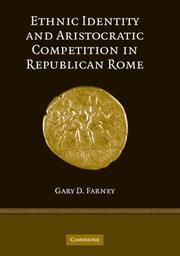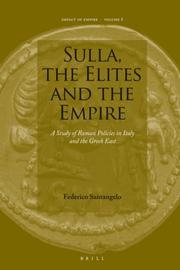| Listing 1 - 7 of 7 |
Sort by
|
Book
Year: 2007 Publisher: Project Gutenberg
Abstract | Keywords | Export | Availability | Bookmark
 Loading...
Loading...Choose an application
- Reference Manager
- EndNote
- RefWorks (Direct export to RefWorks)
Caesar --- Julius --- Juvenile fiction --- Gaul --- History --- Gallic Wars --- 58-51 B.C. --- Rome --- Republic --- 265-30 B.C.
Book
Year: 2007 Publisher: Project Gutenberg
Abstract | Keywords | Export | Availability | Bookmark
 Loading...
Loading...Choose an application
- Reference Manager
- EndNote
- RefWorks (Direct export to RefWorks)
Caesar --- Julius --- Juvenile fiction --- Gaul --- History --- Gallic Wars --- 58-51 B.C. --- Rome --- Republic --- 265-30 B.C.
Book
ISBN: 9783515090278 3515090274 Year: 2007 Volume: 22 Publisher: Stuttgart: Steiner,
Abstract | Keywords | Export | Availability | Bookmark
 Loading...
Loading...Choose an application
- Reference Manager
- EndNote
- RefWorks (Direct export to RefWorks)
Divination --- Omens --- Présages --- Rome --- Religion. --- History --- Religion --- Histoire --- 292.2117 --- Religion Classical Greek and Roman Miracles, prophecy, revelation --- Présages --- Portents --- Prodigies (Omens) --- Signs (Omens) --- Superstition --- Signs and symbols --- Augury --- Soothsaying --- Occultism --- Worship --- Kings, 753-510 B.C. --- Republic, 265-30 B.C. --- Divination - Rome --- Omens - Rome
Book
ISBN: 9782251443188 2251443185 Year: 2007 Volume: hors-série Publisher: Paris: Les Belles Lettres,
Abstract | Keywords | Export | Availability | Bookmark
 Loading...
Loading...Choose an application
- Reference Manager
- EndNote
- RefWorks (Direct export to RefWorks)
Heads of state --- Generals --- Chefs d'Etat --- Généraux --- Caesar, Julius. --- Rome --- History --- Histoire --- Rome ancienne --- --Jules César, --- Ier s. av JC, --- Caesar, Julius --- Sources --- César, Jules, --- Généraux --- César, Jules --- Ier s. av JC, 100-1 av JC --- Heads of state - Rome - Biography --- Generals - Rome - Biography --- Jules César, 101-44 av JC --- Rome - History - Republic, 265-30 B.C. - Sources
Book
ISSN: 00696587 ISBN: 9789516533509 9516533507 Year: 2007 Volume: 123 Publisher: Helsinki : Societas scientiarum Fennica,
Abstract | Keywords | Export | Availability | Bookmark
 Loading...
Loading...Choose an application
- Reference Manager
- EndNote
- RefWorks (Direct export to RefWorks)
Rome --- Navy. --- History, Naval. --- History --- 359.00937 --- Social sciences Sea forces and warfare Ancient World Italy --- Rome - Navy. --- Rome - History, Naval. --- Rome - History - Republic, 510-265 B.C. --- Rome - History - Republic, 265-30 B.C. --- Bases navales --- Guerres puniques --- Histoire navale --- 510-30 av. j.-c. (république)

ISBN: 9780521863315 0521863317 Year: 2007 Publisher: Cambridge: New York: Cambridge university press,
Abstract | Keywords | Export | Availability | Bookmark
 Loading...
Loading...Choose an application
- Reference Manager
- EndNote
- RefWorks (Direct export to RefWorks)
The ancient Romans are usually thought of as a monolithic ethnic group, though in fact they formed a self-consciously pluralistic society. In this book, Gary D. Farney explores how senators from Rome's Republican period celebrated and manipulated their ethnic identity to get ahead in Rome's political culture. He examines how politicians from these lands tried to advertise positive aspects of their ethnic identity, how others tried to re-create a negative identity into something positive, and how ethnic identity advertisement developed over the course of Republican history. Finally, in an epilogue, Farney addresses how the various Italic identities coalesced into a singular Italian identity in the Empire, and how Rome's experience with Italic groups informed how it perceived other groups, such as Gauls, Germans, and Greeks.
Ethnicity --- Group identity --- Aristocracy (Social class) --- Italic peoples --- Ethnicité --- Identité collective --- Aristocratie --- Italiotes --- History --- Histoire --- Rome --- History. --- Ethnicité --- Identité collective --- Ethnology --- Etruscans --- Collective identity --- Community identity --- Cultural identity --- Social identity --- Identity (Psychology) --- Social psychology --- Collective memory --- Ethnic identity --- Cultural fusion --- Multiculturalism --- Cultural pluralism --- Aristocracy --- Aristocrats --- Upper class --- Nobility --- Ethnicity - Rome - History --- Group identity - Rome - History --- Aristocracy (Social class) - Italy - Rome - History --- Italic peoples - History --- Rome - History - Republic, 265-30 B.C.

ISBN: 9789004163867 9004163867 9786611937065 1281937061 9047423712 9789047423713 9781281937063 6611937064 Year: 2007 Volume: 8 Publisher: Leiden: Brill,
Abstract | Keywords | Export | Availability | Bookmark
 Loading...
Loading...Choose an application
- Reference Manager
- EndNote
- RefWorks (Direct export to RefWorks)
This book is a study of Sulla’s policies in Italy and in the Greek East. Its main aim is to show how Sulla revived Rome’s alliances with the local elites at a critical moment for the survival of her Mediterranean hegemony. The discussion calls into play a wide range of political, economic and religious issues, and the argument is developed from three complementary standpoints: role of elites, administration, and ideology. Sulla, the Elites and the Empire deals with both the impact of a prominent individual and the impact of the Roman empire. It sets outs to offer a new understanding of Sulla and his age and, more generally, to contribute to the understanding of the late Roman Republic.
Statesmen --- Elite (Social sciences) --- Sulla, Lucius Cornelius --- Rome --- History --- Politics and government --- Elites (Social sciences) --- Leadership --- Power (Social sciences) --- Social classes --- Social groups --- Sulla, Lucius Cornelius. --- Sylla, Lucius Cornelius --- Sulla Felix, Lucius Cornelius --- Silla, Lucius Cornelius --- Scilla, Lucius Cornelius --- Silla, Lucio --- Syllas, Leukios Kornēlios --- Biography --- Statesmen - Rome - Biography --- Rome - History - Republic, 265-30 B.C. --- Rome - Politics and government - 510-30 B.C. --- Sylla, Lucius Cornelius (0138-0078 av. J.-C.) --- Élite (sciences sociales) --- Politique et gouvernement --- 510-30 av. J.-C.
| Listing 1 - 7 of 7 |
Sort by
|

 Search
Search Feedback
Feedback About UniCat
About UniCat  Help
Help News
News